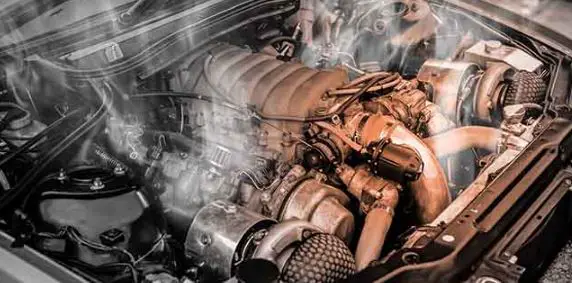There are a lot of things that can go wrong with your car, and one of the most common problems is overheating. This can be caused by a lot of different things, but one possible cause is low oil level. In this blog post, we will discuss what oil does for your car and how important it is to keep your engine running smoothly. We will also talk about how to check your oil level and what to do if you find that you have low oil.
Let’s take a look!

What Function Does Engine Oil Serve?
Oil is a vital component of any car’s engine, and it has a number of important functions. It lubricates the moving parts of the engine, helps to keep the engine clean, and helps to cool the engine.
Without oil, an engine would quickly seize up and stop working. That’s why it’s so important to make sure that your car has enough oil, and that you change the oil regularly.
So how does oil actually work? It’s all down to the way it lubricates the engine. When you start your car, all of the moving parts in the engine start to move very quickly. This creates a lot of friction, which can cause damage to the parts.
Oil forms a thin layer between all of the moving parts, which reduces the amount of friction. This means that the engine can run more smoothly, and it also helps to prevent wear and tear.
As well as lubricating the engine, oil also helps to keep it clean. Over time, bits of dirt and debris can build up in the oil, which can clog up the engine and reduce its efficiency. Regularly changing your oil helps to get rid of these contaminants and keep your engine running at its best.
Finally, oil also helps to cool the engine. As the engine runs, it produces a lot of heat. This heat can damage the engine if it’s not kept under control. Oil helps to dissipate this heat away from the engine, keeping it cooler and running more efficiently.
Can Low Oil Cause Overheating?
Oil is essential for keeping your car’s engine cool. It helps to dissipate heat away from the engine and prevents overheating. If your oil level is low, it can cause your engine to overheat. This can lead to serious engine damage.
How Do you Know If Your Engine Is Overheating Due To Low Oil?
There are a few signs that you can look out for which may indicate that your engine is overheating due to low oil.
The first thing you should do is check the oil level. If it’s low, then this could be the cause of the problem. You can check the oil level by opening the hood of your car and looking at the dipstick. The dipstick will have two marks on it, and you should make sure that the oil level is between these two marks.
If the oil level is low, then you will need to add more oil to your car. You can buy engine oil from most auto parts stores, or you can get it from a mechanic. Once you’ve added more oil, start the engine and let it run for a few minutes. Then, check the oil level again to make sure that it’s correct.
If you find that your engine is still overheating, even after you’ve checked and topped up the oil, then there may be another problem.
Some Other Common Causes Of Overheating
One of the most common reasons for a car to overheat is a leaking or failed water pump. The water pump is responsible for circulating the coolant through the engine to keep it at the correct temperature. If the water pump is not working properly, the coolant will not be able to do its job and the engine will overheat.
Radiator Issues
Another common cause of overheating is a radiator that is not functioning properly. The radiator helps to dissipate the heat from the engine, so if it is not working correctly, the engine will again overheat. Radiators can become clogged with dirt and debris, which can prevent them from doing their job. They can also develop leaks, which will allow coolant to escape and not be available to do its job.
Thermostat
Thermostats can also cause overheating issues. The thermostat is responsible for regulating the flow of coolant through the engine. If the thermostat becomes stuck in the closed position, it will not allow any coolant to flow and the engine will overheat. Thermostats can also become stuck in the open position, which will cause too much coolant to flow and again result in overheating.
Cooling Fan
Finally, a car can overheat if there is a problem with the cooling fan. The cooling fan helps to move air over the radiator to help dissipate the heat. If the fan is not working properly, the engine will once again overheat.
Is It Safe To Drive A Car With Low Oil?
If you’ve ever asked yourself, “is it safe to drive a car with low oil?” – the answer is not as simple as a yes or no. While it’s generally not recommended to operate a vehicle with low oil levels, there are some circumstances where it may be necessary. Here’s what you need to know about driving with low oil levels:
The consequences of driving with low oil levels can vary depending on the severity of the issue. In some cases, it may only result in decreased fuel efficiency and increased engine noise. However, more serious cases can lead to engine damage and even failure.
How Often Should You Check Your Oil?
It’s generally recommended that you check your car’s engine oil level at least once a month, and top up if necessary. However, if you do a lot of short journeys where the engine doesn’t reach its full operating temperature, or if you drive in stop-start traffic, you may need to top up more often.
If you’re unsure how to check or top up your engine oil, consult your car’s owner’s manual. You can also ask a qualified mechanic for advice.








